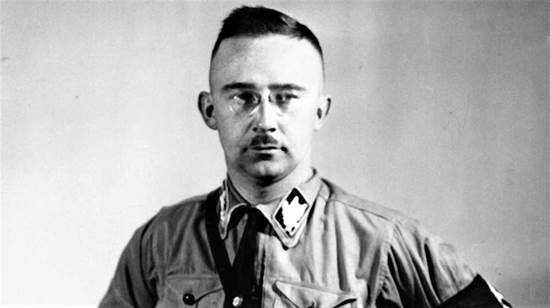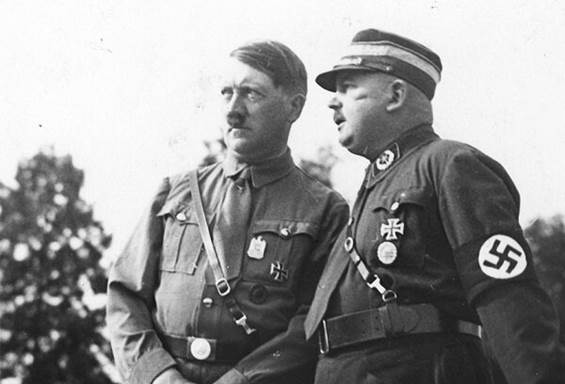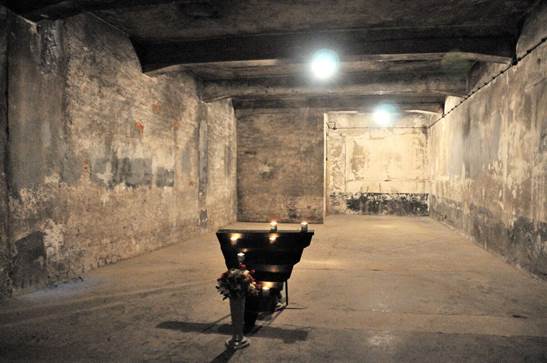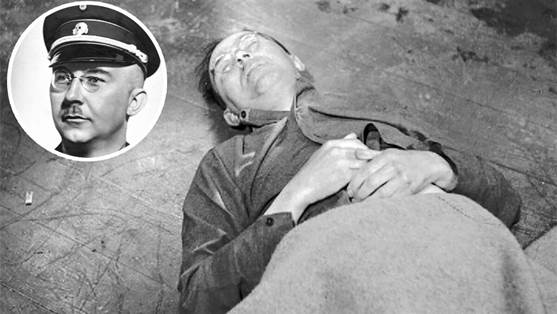He looked more like a schoolteacher with a mediocre appearance than a man who had created a fail-safe machine of mass destruction
May 21, 1945. Germany. The town of Moinstadt, which is located near the Hanseatic German city of Lüneburg.

A British commandant’s patrol, consisting of two Russian men, was moving along a half-empty highway. Former Red Army soldiers Ivan Sidorov and Vasily Gubarev were rescued from German captivity by the British, and after a check, they were included in the commandant’s company.
The day was drawing to a close when Sidorov noticed three people lurking in the bushes by the road. Apparently, they wanted to cross the highway and hide in the woods.
The patrol detained the unknown persons and escorted them to the commandant’s office for checking. The detainees did not arouse any suspicion from the commandant. One of them was particularly pitiful. His leg was injured as he was leaning on a crutch and his left eye was bandaged with a dirty cloth.
A British officer wanted to let them go, but the patrolmen who had brought the Germans in persuaded the Allied not to do so. They say that the detainees should be taken to a prisoner-of-war camp, where specialists will talk to them.
Sidorov and Gubarev looked like they were in the water. One of the Germans turned out to be none other than the former head of the SS, Heinrich Himmler.
The middle son is both
The chief executioner of the Brown Reich, Heinrich Himmler, was the middle son of Joseph Himmler. His father taught literacy in the family of the Prince of Bavaria. He was known as an ardent monarchist and was very flattered when the prince agreed to be the godfather of a boy who was named after him.
The middle son has been sickly since childhood. He suffered from stomach pains. Nearsighted, with a standard sugary facial expression. A bit wild.
But he was a good student. At a young age, he began to play sports. With the help of gymnastic exercises, he wanted to improve his health, as he dreamed of a career in the military.
Thanks to Himmler Sr.’s connections, the 15-year-old Heinrich was enlisted in the Cadet Corps as an officer candidate. But Heinrich Himmler never became an officer.

Heinrich Himmler.
It didn’t make a fuss. Germany capitulated in 1918. The German army practically ceased to exist, and the Cadet Corps, where Himmler studied, was disbanded.
And since the young man did not receive a full-fledged education, he had to go to study at the gymnasium, after which he entered the school at the University of Munich.
Some publications say that he studied at the university. This is not entirely true. He had no higher education. He graduated only from the agronomic department of the school. But he didn’t turn out to be an agronomist either.
Who is to blame
At the school, the future executioner met the “brownshirts”. They, in turn, introduced him to Ernst Röhm. Hitler’s right-hand man and the founder of the Storm Troopers.
It must be said that Henry was never apathetic to politics. On the contrary, he, like Chernyshevsky, was looking for an answer to the question: who is to blame and what is to be done? His new friends told him who was to blame. Communists and Jews.
The seeds fell into the fertile soil. In 1922, the agronomist Himmler left the school a convinced Nazi. In August 1923 he joined the NSDAP, and in November of the same year he took part in the so-called “Beer Hall Putsch”. But he was a so-so participant in the putsch. I was standing somewhere on the sidelines. Most likely, “on the hook”. Therefore, the Bavarian police, after a short interrogation, released the young man on all four sides.
But after these events, Himmler could not find a job. As an “unreliable” person, he was rejected everywhere. And this lack of demand made his views even more radical. He was forced to go to live with his parents, who did not share his views. Therefore, Himmler did not get along very well with his relatives.
He was even ready to go to the USSR to become an agronomist there. I began to learn Russian. Soviet Russia attracted him with vast undeveloped territories. It turns out that he adored the patriarchal peasant way of life. But there were some things he adored more.
At the origins of the SS
Soon, the young man’s life improved. Himmler was taken under his wing by one of the leaders of the Nazi Party, Gregor Strasser. He offered the young man the position of party secretary, and at the same time his personal aide-de-camp.
Ten years later, in 1934, Himmler would “thank” his benefactor. On the so-called “Night of the Long Knives,” he will order the Nazi thugs to finish off their party teacher.

He began to grow a mustache like Hitler’s.
In 1925, the NSDAP began to form SS units. In each local branch of the party, a squad of ten stormtroopers was created. They were headed by the Führer. Heinrich Himmler became such an SS Führer.
Two years later, Himmler proposed to Hitler that the SS should be made something like the Party Guard. All members of these formations must be racially pure and unconditionally loyal to the leader of the Party. Hitler supported Himmler’s idea and appointed him deputy Reichsführer-SS.
Two years later, in 1929, Himmler became Reichsführer SS. The appointment turned out to be more than successful. Under the new Führer, the Party Guard began to increase dramatically in numbers and gained independence from the SA (the NSDAP combat organization).
Monster Transformation
In 1933, when the Nazis came to power, Himmler was the man in Hitler’s entourage who was ready to put the Führer’s ideological ideas into practice. He set up the SS Main Office for Race and Settlement. It checked the Aryan origin of SS candidates. Later, this organization would also decide on the resettlement of SS colonists to the occupied territories.
In the same year, the first concentration camps were established in Germany. Again, Himmler’s idea. He made it clear to German society that those who did not fit into the new Aryan society would “rest” in the camps. All this, of course, was done with Adolf Hitler’s approval.
In 1934, the Brownshirts and their leader, Ernst Röhm, were no longer needed by Hitler. Röhm demanded that the revolution continue, while Hitler made an agreement with major German industrialists who agreed to finance the creation of a new German army. And the storm troopers of Röhm began to be openly feared, since they did not obey the Hitlerite clique.

Adolf Hitler and Ernst Röhm, 1933.
The hour of the head of the SS has come. On June 30, in the so-called “Night of the Long Knives,” the SS dealt with the SA. Several dozen stormtrooper leaders were shot. Their leader, Ernst Röhm, either shot himself or was helped.
From that day on, Heinrich Himmler finally became a key figure in the Third Reich, showing himself to be a soulless machine, handing out death sentences. A monster full of contradictions.
A Large-Scale Killer “At the Desk”
Here is one of the “rationalisation proposals” which the head of the SS himself put forward. He offered to graze the prisoners like sheep. Concentration camp guards would only look after the dogs, and they, in turn, would tear any escapee to shreds.
Starving Jews in gas chambers was also Himmler’s idea. He was worried about his subordinates, as they could become mentally ill by constantly shooting the “inferior.”
He considered the total extermination of the Jews to be a beautiful page in the history of the Third Reich. No matter how many of them there are and no matter what views they hold.

Gas chamber. Auschwitz.
He may well be called the Grand Inquisitor of the Brown Reich. A murderer, but not a small-scale mercenary, but a large-scale killer “at the desk” with a standard sugary expression on his face.
Did everything to save his own skin
The head of the SS was loyal to his Führer only as long as the latter was victorious. He was probably the first of Hitler’s entourage to feel the beginning of the collapse of the “thousand-year Reich”.
There is irrefutable evidence that Himmler knew about the assassination attempt on Hitler in 1944. He did nothing, for he mentally blessed the conspirators and planned to take the place of the Fuehrer.
At the beginning of 1945, Hitler became very disillusioned with the Reichsführer-SS. For some reason, he assumed that the creator of the perfect killing machine might as well command troops.
He first put him in command of Army Group Upper Rhine and then Army Group Vistula. But nothing could stop the avalanche of the Soviet offensive. Georgy Zhukov’s 1st Belorussian Front, during the East Pomeranian operation, slapped Himmler’s thugs in the ass and rolled on to Berlin.
This was the inglorious end of Heinrich Himmler’s career as a military leader. This made him think even more about his future fate. Behind Hitler’s back, Himmler began to negotiate separately with the British and Americans. He hoped to make peace with them, depose the Führer, and take his place.
But the Western Allies knew perfectly well who they were dealing with. With the man who created the machine of mass destruction of people. For them, it was too much. And unnecessary fuss. Even after making peace with Nazi Germany, nothing can be changed. The Red Army was moving towards the lair of the Nazis with incredible speed.
It is still unknown who leaked information about Himmler’s secret negotiations. On April 28, 1945, all the Western radio stations trumpeted the breaking news. They say that Heinrich Himmler, behind the Führer’s back, is negotiating with the British and Americans.

To each his own.
Hitler was furious. He removed Himmler from all posts. Called him a traitor. Tom had no choice but to huddle in the hole and not stick his head out. He suddenly realized that no one would negotiate with him. Nazis loyal to Hitler see him as a traitor, and those who hoped to negotiate with the Western Allies are a nuisance.
Himmler did not even plan his escape in advance. Everything happened unexpectedly, I had to do the documents almost on my knees. And he didn’t really know where to run.
Most likely, he and his fellow travelers sought to cross to Latin America by secret “rat paths”. There was information that the Reich Minister for NSDAP Affairs, Martin Bormann, and the head of the Secret State Police, Heinrich Müller, had already gone there with the party treasury.
And most likely, this escape would have succeeded, if the former prisoners of war of the Red Army Gubarev and Sidorov had not stood in his way. Representatives of a people whom the former head of the SS considered “subhuman.”
And then, in a camp near Lüneburg, when he began to be interrogated by professionals in their field, the former leader of Nazi Germany, realizing that he was about to be exposed, took a bite of an ampoule of poison.
